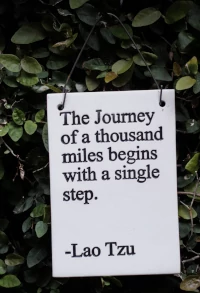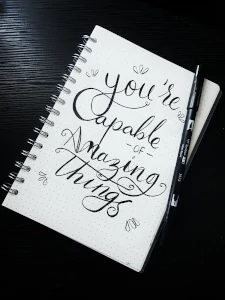Let’s explore what are the 6 benefits of being your own self-help coach and what self-coaching is about.
First, let’s define what self-help is. It is the act of bettering oneself without outside assistance. So, to help ourselves, we must be aware of what we need to work on. This is where self-awareness comes in. Self-awareness is the key to success in self-coaching. Once we become aware of our thoughts, emotions, and behaviors, we can begin to change them.
What is self-coaching?
Self-coaching is the process of using your own awareness, knowledge, and resources to work towards achieving your desired goals. It involves setting yourself personal objectives and then taking action to achieve them. This can be done through a variety of means, such as keeping a journal, setting reminders, or speaking kindly to yourself.
Self-coaching requires you to be honest with yourself about your wants and needs. It also necessitates that you believe in your ability to achieve your goals. This means having faith in yourself and your capabilities. When you set out to coach yourself, it is important to be patient and persistent. Remember that change takes time, so don’t get discouraged if you don’t see results immediately.
Secondly, using self-coaching will save you some money as you don’t need to pay a coach right away. Later, you could still decide to use the help of a professional coach as well. Thus, even if you could not afford a coach right now, you could still start your coaching journey.
Now, it’s time to explore the benefits of self-coaching.
1. Self-coaching helps to develop greater awareness and understanding.
Self-coaching helps you to develop a greater understanding of yourself. It allows you to step back and reflect on your thoughts, feelings, and behaviors. This can help you to see things more clearly and make better decisions.
Our thoughts and feelings are leading to our behaviors. Furthermore, our thoughts and feelings could tend to be positive or negative. When they are mostly negative, chances are high that we do not live the life we want to live. On the other hand, by having mostly positive thoughts and feelings, chances are much higher, that we are happier and enjoy our life no matter what happens.
2. Self-coaching allows us to focus on our goals.
Self-coaching is a process that helps you to become more aware of yourself, your values, and your goals. It helps you to understand your strengths and weaknesses and how to use them to your advantage.
Self-coaching also helps you to set goals and achieve them. It gives you the tools and techniques to help you overcome obstacles and achieve success. When it comes to goals, you could compare self-coaching with a navigation system. The navigation system wouldn’t help you if you don’t know where to go. By selecting a destination, the navigation system will help you to get there. The same is true for self-coaching.
At the start, you need to decide where to go. Then you apply self-coaching methods to help you, reach your destination.
3. Self-coaching helps you to get in touch with your true self.
As said, self-coaching enables you to be more aware of your thoughts, feelings, and behaviors. This allows you to understand why you think, feel, and behave the way you do. Once you understand yourself better, you can start making changes that will lead to a more fulfilling and happier life.
The deeper you dig into your thoughts and feelings, the more you may recognize your true nature.
What does getting in touch with my true self means?
Since everyone’s path to self-awareness is unique, there’s not one answer to this question. However, some common ways to become more in touch with your authentic self include things like meditation, journaling, and spending time in nature. The key is to find what works for you and stick with it! Regular self-coaching can help to ground you in your values and keep you on track as you navigate life’s challenges.

When you are more in touch with your true self, you may find that making decisions becomes easier. This is because you are no longer basing your choices on what others think or what society expects of you. Instead, you can listen to your inner wisdom and make choices that reflect your authentic values and desires. This can lead to a more fulfilling and meaningful life.
The most important thing is to get started on your journey and to be patient with yourself. It takes time to get in touch with your true self, but it is well worth the effort!
4. Self-coaching allows you to explore and discover your full potential.
Self-coaching is not just about being aware of your current situation and making improvements. It’s also about taking the time to explore your full potential and discovering what you’re truly capable of. This process requires self-awareness, as well as a willingness to experiment and try new things. By engaging in self-coaching, you can push yourself to reach new heights and achieve more than you ever thought possible.
5. Self-coaching can lead to significant life changes and breakthroughs.
Self-coaching is oftentimes the key to making significant life changes and breakthroughs. It allows you to get in touch with your innermost thoughts and feelings, and understand why you think and feel the way you do. This understanding can be incredibly empowering and can help you make positive changes in your life.
If you’re interested in self-coaching, there are a few things you can do to get started. First, read up on the subject and educate yourself about the different techniques and approaches. There are many excellent books and articles available on the subject. The process can be immensely helpful and can lead to lasting changes in your life.
6. Finally, self-coaching is empowering and liberating!
Self-coaching can help you to take control of your life and create the life you want. It can also help you to feel more confident and capable. Self-coaching is a magnificent way to improve your life and relationships. If you are ready to make a change in your life, self-coaching is a great way to start.

As the above describes great benefits you could realize for yourself, there might be other things you may like to know about self-coaching as well.
Here are a few questions that may help you to get an even better understanding of self-coaching.
Of course, this list of questions might not be complete, it will still provide you with more insights.
How often should you apply self-coaching techniques?
There is no definitive answer to this question. However, it is generally advisable to use self-coaching techniques daily, or at least as frequently as possible. This will help you to maintain a high level of self-awareness and keep your mind focused on positive goals. Additionally, the more frequently you practice self-coaching, the more effective it will be.
How many self-coaching methods are available?
There are many self-coaching methods available. However, not all of them will be suitable for everyone. It is important to find a method or methods that work well for you and that you feel comfortable with. You may need to experiment with different techniques before you find the ones that work best for you.
Are self-coaching methods complicated to use?
No, self-coaching methods are not complicated to use. They are usually quite simple and easy to understand. However, it is important to remember that self-coaching is a process, and it may take some time to get the hang of it. Be patient with yourself and don’t be discouraged if you don’t see results immediately.
Some common self-coaching techniques include journaling, visualization, affirmations, and goal setting.
What are some common self-coaching mistakes?

One of the most common self-coaching mistakes is trying to do too much at once. When you first start practicing self-coaching, it is essential to take things slowly and focus on one thing at a time. Otherwise, you may become overwhelmed and discouraged. Additionally, it is critical to be patient with yourself and to remember that change takes time. Rome wasn’t built in a day, and neither is a new you!
Self-coaching can be an incredibly powerful tool for personal growth and development. Remember to take things slowly, be patient with yourself, and find a method or methods that work well for you. With a little effort and commitment, you can achieve great things!
How long does it take to go through one full self-coaching cycle?
Well, that depends on your goal, your willingness, and your determination to achieve the goal you have set. Also, it depends on how much time you could invest into the coaching process and the actions you need to take.
For some goals, you may need a couple of weeks or months. While other goals may be accomplished much faster. As mentioned above, you need to be patient and persistent until you have reached your goal. That said, it only depends on you and your efforts.
How long should a self-coaching session be?
It depends on what you want to achieve in your session, and how much time you have available. However, as a general guide, we recommend allowing at least 30 minutes for each session. This will give you enough time to explore your thoughts and feelings, and start to develop some actionable plans.
If you’re short on time, you can still get a lot out of self-coaching by taking just 10-15 minutes to check in with yourself each day. During this time, you can reflect on how you’re feeling and what you want to achieve. You might also want to spend a few minutes each week planning your goals and actions for the week ahead.
How do I know if I need a professional coach?
If you feel like you’re struggling to make progress with your self-coaching, it might be time to seek professional help. A professional coach can provide you with support, guidance, and accountability. They can also help you to develop customized action plans and identify any roadblocks that are holding you back.
If you’re not sure whether you need a professional coach, you can always start by trying self-coaching first. If you find that you’re not making the progress you want, or if you’re struggling to stick to your action plans, then professional help may be the best option for you.
Conclusion
Self-coaching is a powerful tool that can help you to achieve your goals and create lasting change in your life. However, it is important to remember that self-coaching is not a magic bullet. It takes time, effort, and commitment to see results. Additionally, self-coaching is not appropriate for every situation. If you are facing serious life challenges, it is critical to seek professional help. Nonetheless, self-coaching can be an immensely valuable tool for anyone who is looking to make positive changes in their life.
Thanks for reading! We hope this article has been helpful.
Take a Check if you are ready for self-coaching.
Another good start for your self-coaching journey could be to love yourself more. Find out more about the “Love Yourself – Workbook”, that I published recently.
